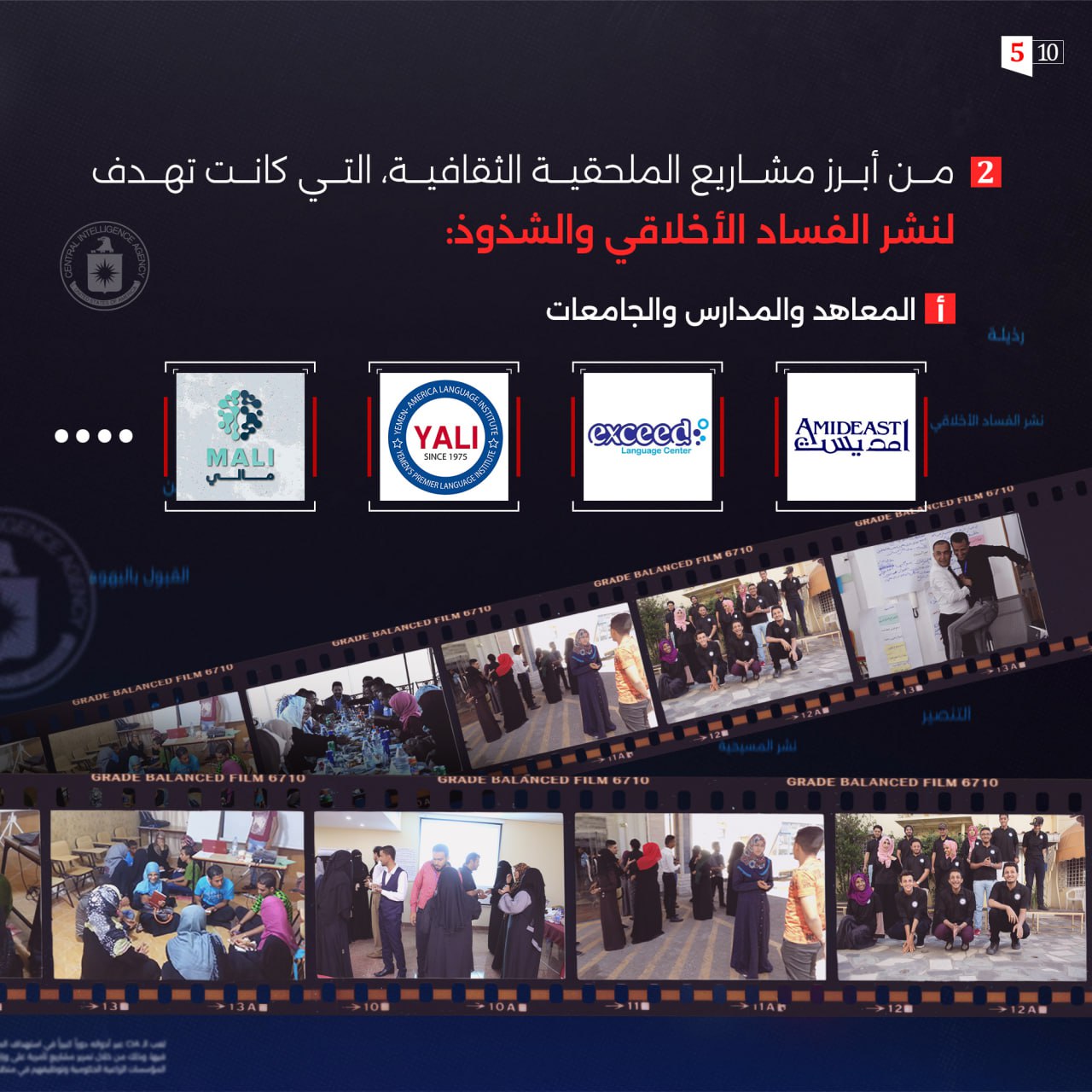The American intelligence agencies have been actively working to destroy Yemen's cultural fabric by spreading corruption and attempting to undermine the nation's faith-based identity. Last Saturday, Yemeni security agencies released new confessions from a U.S.-Israeli espionage network, detailing their activities through various institutions, including educational ones.
Spy Hisham al-Wazir disclosed that the AMIDEAST project, a significant player in this espionage effort, had various initiatives, with the media department being one of the most critical. He explained that AMIDEAST, along with other American institutions like the YALI Institute, trained and recruited young men and women. They focused on the most intelligent among them, sending them on scholarships to American-affiliated institutions like the American University of Beirut, the American University in Cairo, and Duke University in the United States. These young recruits were then drawn into serving American interests. Al-Wazir highlighted individuals such as Farea al-Muslimi, Osama al-Ruhani, and Bara'a Shaiban, who are now prominent figures writing for American audiences and condemning Ansar Allah while defending the U.S.-Saudi coalition in a humanitarian light.
Al-Wazir further noted that AMIDEAST and YALI Institutes, under the direct supervision of Sabrina Fieber, coordinated with the CIA. The key figures managing this operation included Hisham al-Ameisi and Ibrahim al-Khidr.
He continued to explain that AMIDEAST's youth activation project, managed by Sabrina Fieber, aimed to recruit influential community members through sports and recreational clubs. These clubs received support, such as solar power systems and sports equipment, to attract youth participation. The recruited youths were then given life skills training, which, in Western terms, meant indoctrination with Western ideas. These individuals would later influence their communities with these ideas.
Spy Jamal Sultan revealed that one of the American objectives was a "soft war" against developing countries like Yemen. This involved spreading American culture, detaching young people from their identities, and instilling Western beliefs. He pointed out that educational curricula were adapted to promote Western culture, encouraging behaviors like public exposure that are alien to Yemeni society.
In a voice recording, spy Mohammed al-Waziza disclosed that schools like the Indian, British, Pakistani, and Turkish schools, as well as Lebanese and Emirati universities, were targeted to inculcate Western culture. This included promoting coeducation and encouraging women to participate alongside men in various activities, focusing on entertainment to foster close relationships.
Al-Waziza emphasized that this indoctrination led students to adopt Western values, distancing themselves from Yemeni culture without regard for religious or cultural norms.
Spy Shaif al-Hamdani revealed a particularly alarming aspect: the American embassy's support for LGBTQ individuals through various programs. The cultural attaché promoted LGBTQ rights at the YALI Institute and other language institutes by distributing booklets advocating for personal freedom. Al-Hamdani added that these efforts included helping LGBTQ individuals obtain travel visas under the pretext of being persecuted for their sexual orientation.
Another spy, Abdul Qader al-Saqqaf, mentioned that the moral corruption promoted by these institutes, through civil society organizations, ultimately aimed to spread vice.
Al-Waziza's voice recording also confirmed that the American embassy issued special visas for LGBTQ individuals. He noted that the YALI Institute subtly promoted LGBTQ issues through specific stories and had openly LGBTQ teachers, while foreign films were used to encourage learning English.
Hisham al-Wazir explained that AMIDEAST played a significant role in recruiting for American interests through social and educational programs, sending young people and notable figures to intensive training courses in the U.S. to establish lasting connections.
Spy Bassam al-Muradihi added that Inas al-Alimi encouraged students to apply for scholarships by visiting English language institutes and private schools, organizing seminars to motivate them. One such individual, Osama al-Ruhani, who went to America on a cultural exchange program, returned to hold a senior position at the National Democratic Institute (NDI) and is currently the deputy head of the Sana'a Center for Strategic Studies. Even after the American embassy closed, applications for these scholarships were processed at AMIDEAST until its closure around 2018.
These revelations depict a concerted effort by American intelligence to erode Yemeni culture and promote Western values, posing significant challenges to the nation's identity and social fabric.







